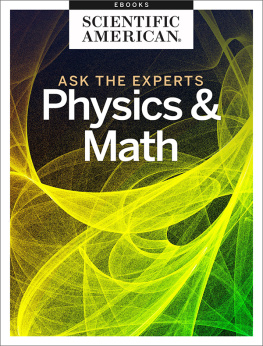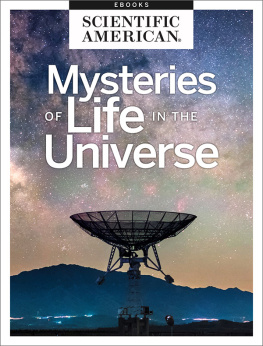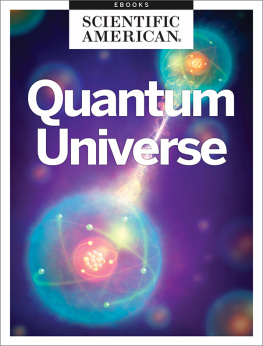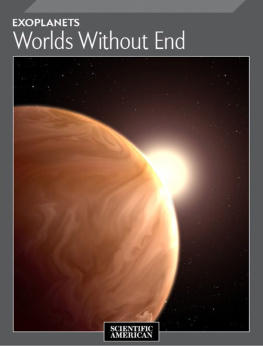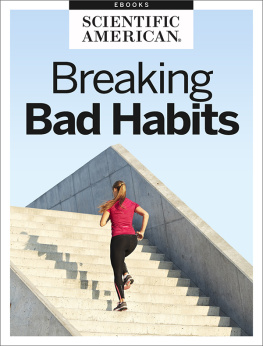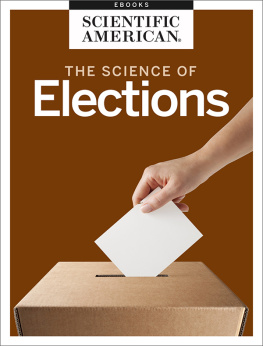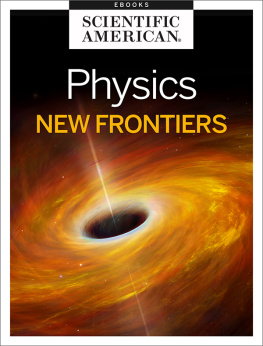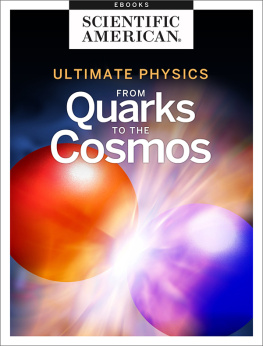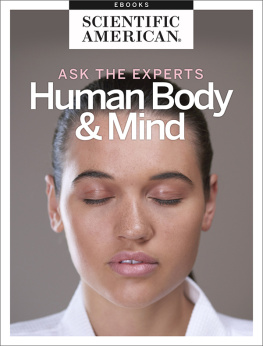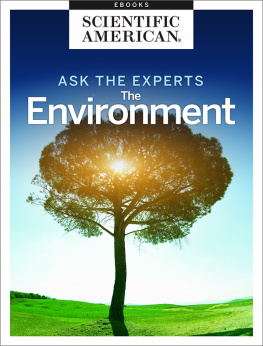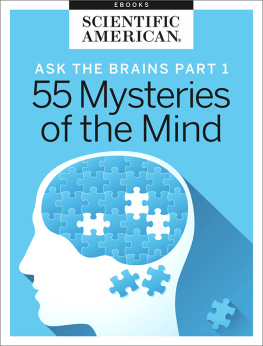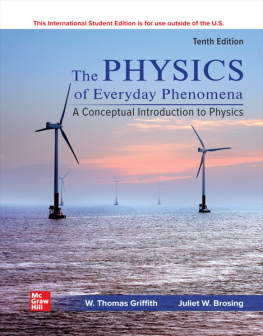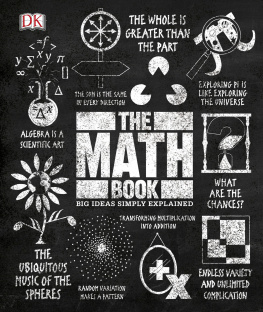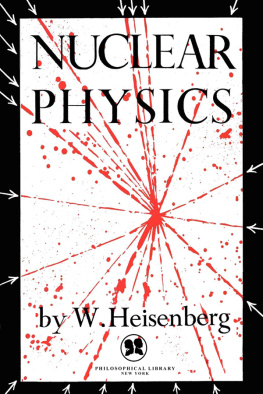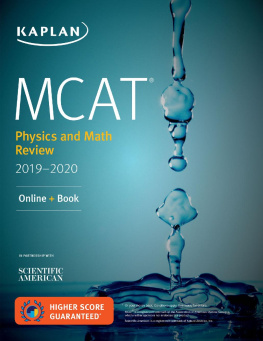ASK THE EXPERTS
Physics and Math
From the Editors of Scientific American
Image Credit: PASIEKA/Getty Images
Letters to the Editor
Scientific American
One New York Plaza
Suite 4500
New York, NY 10004-1562
or editors@sciam.com
Copyright 2017 Scientific American, a division of Nature America, Inc.
Scientific American is a registered trademark of Nature America, Inc.
All rights reserved.
Published by Scientific American
www.scientificamerican.com
ISBN: 978-1-4668-5888-6


ASK THE EXPERTS
Physics and Math
From the Editors of Scientific American
Table of Contents
Introduction
by Geoffrey Giller
Section 1
1.1
by Stephen Reucroft and John D. Swain
1.2
by Stephen Reucroft and John D. Swain
1.3
by Aksel L. Hallin
1.4
by Morton Tavel, Kurt T. Bachmann and Victor J. Stenger
1.5
by Fred Wudl
1.6
by Gordon Kane
1.7
by Joseph S. Merola
1.8
by James Kakalios and John Matson
1.9
by Raymond Y. Chiao
Section 2
2.1
by Helen G. Grundman, Glenn H. Stevens and Fernando Q. Gouv
2.2
by Herbert A. Simon and James P. Crutchfield
2.3
by Saul I. Gass
2.4
by H. Eugene Stanley and David Biello
2.5
by Andrew Gelman
2.6
by Melvin Henriksen
2.7
by Robert Kaplan
2.8
by Steven Bogart
2.9
by Chris Wiggins
2.10
by John T. Baldwin and Olivier Lessmann
Section 3
3.1
by Tom Zepf and Scott M. Auerbach
3.2
by Peter N. Saeta
3.3
by Ciara Curtin
3.4
by David Dearborn
3.5
by Martin A. Uman, Peter H. Handel and John Lowke
Section 4
4.1
by Andrew Trupin, Steinn Sigurdsson and Morton Tavel
4.2
by Kenneth D. Schlecht
4.3
by Robert Ehrlich
4.4
by Mark Shegelski
4.5
by David Politzer
Section 5
5.1
by R. Michael Barnett, Helen Quinn and Maria Spiropulu
5.2
by Jesse Gordon
5.3
by Stephen Reucroft and John D. Swain
5.4
by Matt Visser, John Obienin, John Baez and Paul A. Deck
5.5
by Richard Newrock
5.6
by Gary T. Horowitz, William A. Hiscock and John L. Friedman
5.7
by John Baez, William G. Unruh and William G. Tifft
5.8
by Andrea Prosperetti and Lawrence A. Crum
5.9
by Michael J. Schaffer and Robert F. Heeter
Have You Ever Wondered...
Humans are innately curious.
From a young age, we start to ask questions about the world around us. We want to understand why things are they way they are. But even the most simplistic-sounding questions Why is the sky blue? or Why do things fall down? turn out to have surprisingly complex answers. (In brief, light scattering by the atmosphere and gravity are the answers to those questions, though of course the technical answers are much more in-depth).
If simple questions have such relatively complex answers, then the more sophisticated questions we ask as we get older must also have more complicated answers. For those more difficult problems, we must often turn to experts. Scientific Americans Ask the Experts column has been doing just that for years. Across all fields of science, Scientific American has asked top scientists, professors and researchers to answer questions from the basic to the esoteric. Many questions came from readers; others came from our editors. Some questions relate to recent events, while others have to do with long-standing theories; some affect our daily lives, while others are for the pure pursuit of knowledge.
A popular department that ran for decades, the hundreds of entries in our archives run the gamut across subjects from astronomy to the environment to technology. Now, weve combed through those archives and have compiled some of the most interesting questions (and answers) into a series of eBooks. Organized by subject, each eBook within the series provides short, easily digestible answers to questions on that particular branch of the sciences.
The first eBook in our series Physics and Math explains a wide range of natural phenomena and mathematical concepts. Have you ever wondered what exactly antimatter is? Two researchers who wrote a book about particle physics and a PhD student at Harvard explain it in Section 5, Stranger Things. Or, have you ever heard the rumor that glass is actually a supercooled liquid, and that thats why old windows are thicker at the bottom than on the top? In Section 3, Everyday Physics, a chemistry professor from the University of Wisconsin, Madison and an antique glass researcher at the Corning Museum of Glass shatter this myth while explaining why glass is in fact a strange material.
How about game theory, quantum mechanics and the origin of pi? Mathematicians and professors from universities across the country tackle these topics, drawing on their extensive expertise to give answers that are at once accurate and comprehensible by those who havent studied physics or math since high school.
You might also come across some questions that you wouldnt have even known to asksuch as, Are mathematicians finally satisfied with Andrew Wiless proof of Fermats Last Theorem? They are, as youll read in Section 2, Doing the Math. But the answer also reveals why it took so long to prove this theorem.
Looking for answers to questions on Biology? The Environment? Chemistry? Or Everyday Science? Be sure to check out our other eBooks in this series. Youll discover things like what makes a knuckleball flutter, whether we really only use 10% of our brains, why snowflakes are symmetrical and much more.
Geoffrey Giller
Book Editor
SECTION 1
World of Small Things
How Are Elements Broken Down into Protons, Electrons and Neutrons?
This explanation is provided by the team of Stephen Reucroft and JohnD. Swain, professors at the Department of Physics of NortheasternUniversity.
First it's probably a good idea to review of what anatom is made of. Basically, it contains a nucleus,holding some number (call it N) of positively chargedprotons, which is surrounded by a cloud (N) ofnegatively charged electrons. The force that holds theelectrons and protons together is the electromagneticforce. The number N tells you what element youhave: for hydrogen N equals 1, for helium, 2, and soon.
The same electromagnetic force that draws oppositecharged electrons and protons together tries to pushthe protons (which all have the same charge) awayfrom each other. To avoid this separation, anotherparticle comes into play in the nucleus: the neutron.Much like a proton in mass but without electric charge, the neutron is essential forholding the nucleus together. At short distances (i.e., within the nucleus), a verystrong force, more powerful than electromagnetism, takes over and attracts theprotons and neutrons. For most elements, there are several possibilities as to howmany neutrons can fit into the nucleus, and each choice corresponds to a differentisotope of that element.
Suppose you want to pull an atom apart. The first thing you need to do is get rid ofthe electrons. There are lots of ways to do this. You can shine light on the atom, orexpose it to another form of electromagnetic radiation having an even shorterwavelength. Also, you can hit it with particles such as electrons or other atoms.Actually, light is made of little chunks called photons, so shining light on an atom isreally just a special case of whacking it with other particles.

